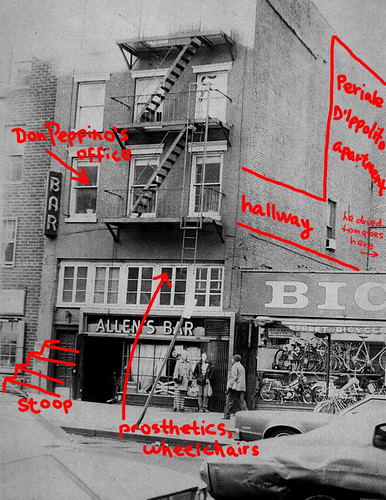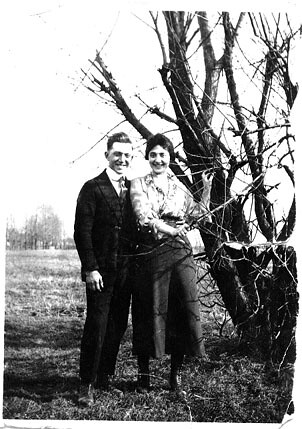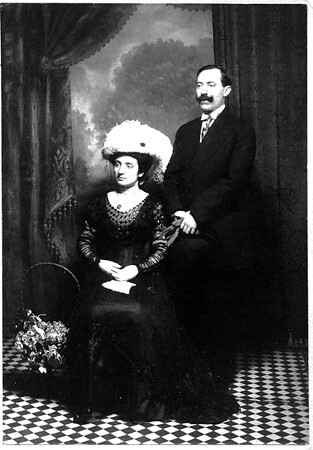
14th Street, c. 1976, NewYork, N.Y.
Don Peppino would also make a delicious sun-dried tomato sauce in the summer on the roof of their apartment building on 14th Street.
Don Peppino would also make a delicious sun-dried tomato sauce in the summer on the roof of their apartment building on 14th Street.
He would take the center section of a barrel and stretch a fine mesh screen over the top. He would then set ripe tomatoes on the screen to dry for hours in the sun. When the tomatoes were ready, he would mash the tomatoes, pressing them through the mesh of the screen. The sauce would drip into the large pot he had set below his homemade sieve/drying rack.What a nice way to spend a fine sunny New York City day—Don Peppino and Giovanna (or Giovannina, as he sometimes called her) out on the roof with their grandchildren playing nearby.
Giovanna was quite a cook in her own right.
The family differs (argues?) on where Giovanna was born, convinced they heard she was from:
Cousin Judith: AlbaniaThe most frequent place that is mentioned is Piana dei Greci, (now called Piana degli Albanesi), about 24 km south of Palermo, in Sicily. It was originally settled in the late 15th and early 16th century by Albanians and Greeks. S everyone is a little bit right . . .
Aunt Paula: Malta
Uncle Jim: Grecia Romana
Mom: Magna Grecia
Giovanna’s cooking had a decidedly Greek influence. She was apt to include lemons in many of her recipes. One of her favorites was a fish soup.
Giovanna’s fish soup:Don Peppino was the D’Ippolito/Periale pater familias. If anyone needed money, Don Peppino would pull out his roll of bills, his “wad,” as my dad would call it, and help them out. He helped everyone out.
Whitefish, whole, put in large soup pot with whole head of garlic, big handful of fresh parsley, sauteed whole onion, lots of pepper.
Remove fish from pot after cooking for an hour, debone, put meat back into pot.
Right before serving, squeeze the juice of a whole lemon into the pot.
Variations: crush and drop angel hair pasta into soup; add one whole egg, stirring quickly.
Sometimes she would marinate the fish flesh and they would make a salad with it.
After the First World War, when Don Peppino decided to retire from the restaurant business, he got “the calling.” Many people would come to him for treatment, ranging from simple aches and pains to all manner of ailments. He would apply salves and the laying-on-of-hands to remove their ills. If anyone in their New York City Italian community felt out-of-sorts someone would say, “You must go and see Don Peppino, he will take care of you.” He was a healer.

L-R: Alfred D'Ippolito, Margaret Periale, Gertrude D'Ippolito & John Angelo Periale, c. 1921.
Don Peppino’s clients were Sicilians and Italians primarily, coming from all over the city and the outskirts, to take treatments. The mid to late 20s and early 30s were still a time when Italians living in the U.S. spoke Italian, not having much, if any, English. Don Peppino’s treatments helped pave the way for his daughter Gertrude to meet John Angelo. John Angelo lived in northern New Jersey, Lodi, with his family. The Periales came to hear about Don Peppino. One day John Angelo brought his ailing mother Paola (who had dropsy?) to the city to consult with Don Peppino.
Don Peppino’s clients were Sicilians and Italians primarily, coming from all over the city and the outskirts, to take treatments. The mid to late 20s and early 30s were still a time when Italians living in the U.S. spoke Italian, not having much, if any, English. Don Peppino’s treatments helped pave the way for his daughter Gertrude to meet John Angelo. John Angelo lived in northern New Jersey, Lodi, with his family. The Periales came to hear about Don Peppino. One day John Angelo brought his ailing mother Paola (who had dropsy?) to the city to consult with Don Peppino.
Don Peppino initiated a series of treatments, necessitating a series of visits to 14th Street. While waiting for his mother, John Angelo met Gertrude. After his mother was on the mend, John Angelo kept coming by. Don Peppino consented to let him take Gertrude out, with a condition: the two were sent on double-dates with Gertrude’s older brother Albert and John Angelo’s older sister Margaret as chaperones. In fact, Albert and Margaret would often ditch the young couple and set off on their own. Not only did Gertrude and John Angelo fall in love and marry, in 1920, but Albert and Margaret ended up marrying also!

John Angelo Periale & Gertrude D'Ippolito, c. 1921.
Don Peppino's most well-known treatment was the Pumata, the Green Salve. No one in the family is exactly sure of all the ingredients today, but it is agreed that it contained quinine. Don Peppino came up with the recipe, but Giovanna would make it, boiling and stirring the mixture in a huge copper pot. They would make it in huge quantities and then dispense the Pumata into old Noxzema jars and distribute it among the family as well as his clientele, as a cure-all. It is believed that all the ingredients came from the local drugstore and it was the combination and the healing application by Don Peppino that made it a special treatment.
During these consultations most clients would speak to Don Peppino in Sicilian. Sometimes Gertrude was asked into his office to translate for an English-speaking client. The family got used to frequent visitors coming to call and being ushered into Don Peppino's study to receive treatment.

Joseph Francis Periale, Paula Periale & John Angelo Periale, 6 August 1932, Grant's Tomb, N.Y.
Once a woman came to their apartment, screaming and crying. Don Peppino took her into his study and calmed her down and treated her many bruises with comforting salves.
Five-year old Paula asked her mother, “What happened to her?”
Gertrude answered, “Her husband hit her.”
Paula replied, “Why would she stay with him?”

John Massimo Periale, c. 1923, N.Y.
One hot summer day, a visitor, one of Don Peppino's patients, left his coat in the hall as he went into the room to consult with Don Peppino. This led quickly to an “incident.” As John Massimo tells it, Albert, Gertrude’s brother, taught John Massimo as a small boy to stop crawling and to stand up by playing a game: Albert would put a few pieces of candy in his coat pocket. Little John Massimo would push himself up from the floor to reach into his uncle’s coat pocket to get a treat.
While Don Peppino was busy on this particular occasion with his visitor, John Massimo was crawling around the apartment. The toddler made his way to the man’s coat, which he had left draped over a chair outside Don Peppino’s study. John Massimo pulled himself up and reached into the coat pocket and took out his prize—not candy this time, but a snub-nose .38. He started to drag it down the hall, thumping it on the floor all the way. His Aunt Rose saw him, started screaming and the rest of the family, running out to see what had happened, joined the uproar. Hearing all the commotion, Don Peppino came out of his study, with the man right behind him and quickly sized up the situation. He turned to the man, angrily, “What are you doing, bringing a piece into my home, into my house?” He told the man to leave and never come back again. The man was “one of the boys.”

wedding photo of Fanny D'Ippolito and Joe Battaglia, c. 1914, N.Y.
Don Peppino kept a turtle in his office. One day when Gertrude’s sisters Mary and Fanny were visiting and little Paula was playing in his office, the turtle appeared. Paula screamed, Mary and Fanny ran in and saw her facing off the huge turtle. He had disappeared for weeks previously. The turtle had full run of the house.
John Massimo adored his grandfather and would spend as much time with him as possible. Don Peppino liked to spend the nights smoking cigars in his study. In the early evening he would rise from his chair in the study, walk over to the window and throw it open and take a series of deep breaths. This was the only fresh air he got. He stored the cigar stubs in a box. When he collected enough stubs he would grind them and put them in his pipe—waste not want not. One cold February evening John Massimo was in the room with his grandfather when he rose to take his evening “airing.” The window faced 14th Street and had a view of the front entrance of a speakeasy across the street. John Massimo joined his grandfather at the window.
They both watched a man come out of the speakeasy as a car pulled up, rapidly followed by three shotgun shots. Dazed, they stared as the man fell to the sidewalk and the front of the speakeasy was shot full of bullets. Don Peppino quickly recovered himself, pulled down the shade, pulled John Massimo down to the floor and turned off he lights.
“You didn’t see anything, ” Don Peppino sternly told the boy. John Massimo checked the papers for weeks afterward, but there was never any mention of a murder...

Don Peppino kept a turtle in his office. One day when Gertrude’s sisters Mary and Fanny were visiting and little Paula was playing in his office, the turtle appeared. Paula screamed, Mary and Fanny ran in and saw her facing off the huge turtle. He had disappeared for weeks previously. The turtle had full run of the house.
John Massimo adored his grandfather and would spend as much time with him as possible. Don Peppino liked to spend the nights smoking cigars in his study. In the early evening he would rise from his chair in the study, walk over to the window and throw it open and take a series of deep breaths. This was the only fresh air he got. He stored the cigar stubs in a box. When he collected enough stubs he would grind them and put them in his pipe—waste not want not. One cold February evening John Massimo was in the room with his grandfather when he rose to take his evening “airing.” The window faced 14th Street and had a view of the front entrance of a speakeasy across the street. John Massimo joined his grandfather at the window.
They both watched a man come out of the speakeasy as a car pulled up, rapidly followed by three shotgun shots. Dazed, they stared as the man fell to the sidewalk and the front of the speakeasy was shot full of bullets. Don Peppino quickly recovered himself, pulled down the shade, pulled John Massimo down to the floor and turned off he lights.
“You didn’t see anything, ” Don Peppino sternly told the boy. John Massimo checked the papers for weeks afterward, but there was never any mention of a murder...

L-R: John Massimo Periale, John Angelo Periale, Joseph Francis Periale, Paula Periale, James Gabriel Periale, c. 1932.
John Massimo was always a great jokester and a smart-aleck. When he was ten (c. 1931) and his family was still living with Don Peppino, he used to attend summer school across the street from where they lived on 1st Avenue and 14th Street. One of the older girls (16 or so) would pick on him, getting him to do her “pig work,” always making him clean the blackboards, erasers, etc. She probably had a crush on him, but John resented always having to do the dirty work.
One time when she asked him, “Johnnie, go clean the blackboard,” He responded, “ No, I won’t!” She said, “Why not?” He answered by calling her a dirty name in Sicilian (by making reference to her mother’s reproductive organs.) She, unfortunately for him, understood, and slapped him hard across the face, first one side, then the other.
“Dove vive (Where do you live)?” she shouted angrily.
He answered, “Avenue D.” She didn’t know that he actually lived right across the street.
“I’m going to tell your mother. I’m going right now to tell her—wait until you get home!”
And she set off for Avenue D.
John Massimo crossed the street, went inside the building and upstairs to their apartment. Gertrude saw him enter, with one bright red cheek. When she asked him why his cheek was so red. He answered, “Because a girl hit me.”
“Why did she hit you?”
John Massimo was always a great jokester and a smart-aleck. When he was ten (c. 1931) and his family was still living with Don Peppino, he used to attend summer school across the street from where they lived on 1st Avenue and 14th Street. One of the older girls (16 or so) would pick on him, getting him to do her “pig work,” always making him clean the blackboards, erasers, etc. She probably had a crush on him, but John resented always having to do the dirty work.
One time when she asked him, “Johnnie, go clean the blackboard,” He responded, “ No, I won’t!” She said, “Why not?” He answered by calling her a dirty name in Sicilian (by making reference to her mother’s reproductive organs.) She, unfortunately for him, understood, and slapped him hard across the face, first one side, then the other.
“Dove vive (Where do you live)?” she shouted angrily.
He answered, “Avenue D.” She didn’t know that he actually lived right across the street.
“I’m going to tell your mother. I’m going right now to tell her—wait until you get home!”
And she set off for Avenue D.
John Massimo crossed the street, went inside the building and upstairs to their apartment. Gertrude saw him enter, with one bright red cheek. When she asked him why his cheek was so red. He answered, “Because a girl hit me.”
“Why did she hit you?”
“Because I called her a name.”
“What name did you call her?” He whispered the word to her and she slapped him hard across the other cheek.
“Don’t you ever use those words!”
“But I hear you use them all the time!”
Gertrude was taken aback. “Never mind what I say. You don’t say them!”
Gertrude was taken aback. “Never mind what I say. You don’t say them!”
At this point, Don Peppino and John Angelo couldn’t stop laughing and told Gertrude to leave the boy alone!
Comments
Post a Comment